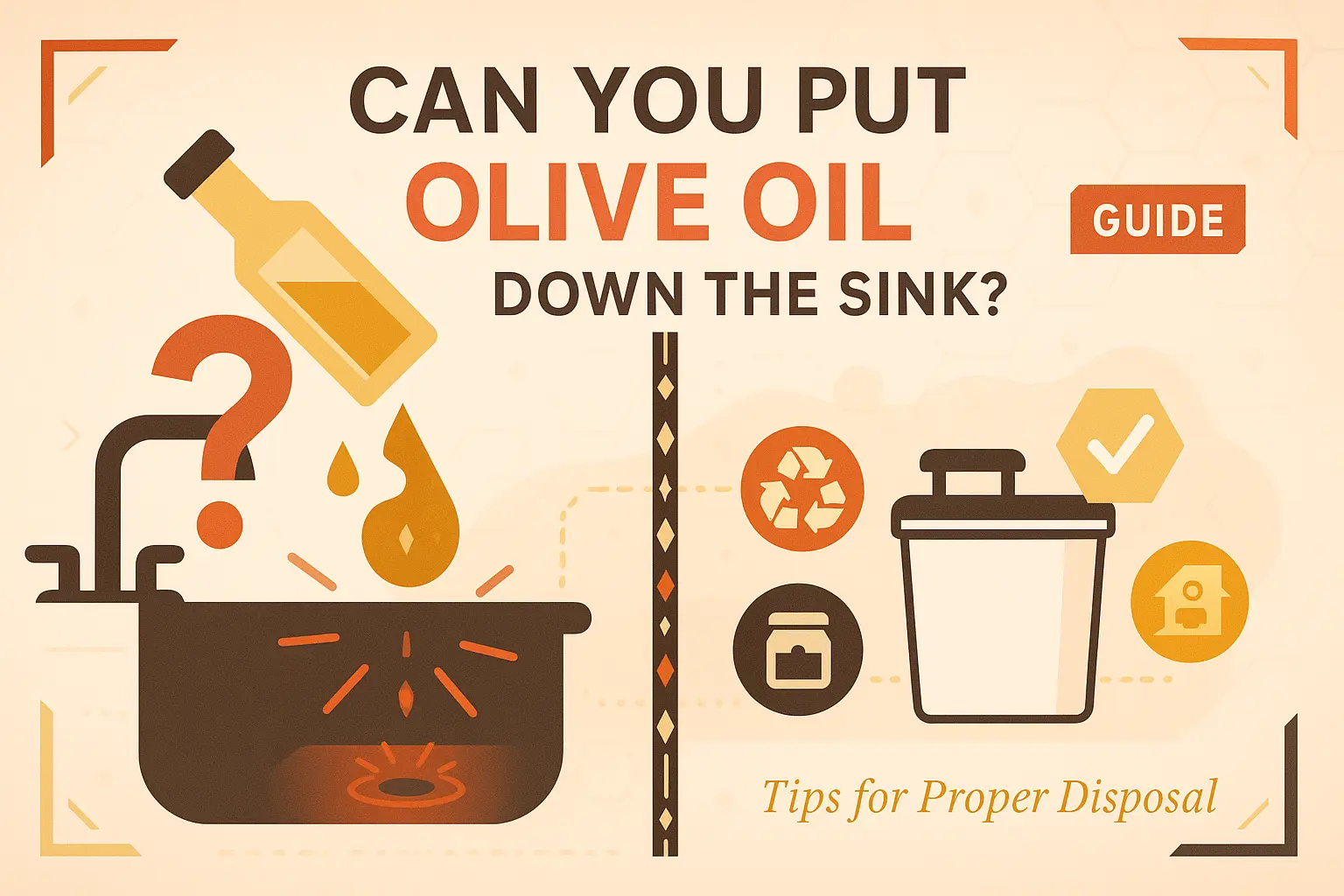Table of Contents
Highlights
- Pouring olive oil down the sink can lead to costly plumbing blockages and severe environmental issues, as it solidifies in pipes and contributes to sewage overflows.
- Proper disposal methods for olive oil include wiping small amounts with a paper towel for trash disposal, and recycling larger amounts at designated centers or local restaurants.
- Myths about olive oil disposal, such as the safety of pouring small amounts down the drain or using hot water to mitigate clogs, can lead to long-term plumbing problems and environmental harm.
Introduction to Cooking Oils
Cooking oils are a staple in every kitchen, from olive oil and vegetable oil to coconut oil and bacon grease. These oils are essential for preparing countless recipes, but what happens after the cooking is done is just as important as how you use them. Proper cooking oil disposal is crucial for maintaining a healthy plumbing system and protecting the environment.
When you pour used cooking oil, such as olive oil or bacon grease, down the sink, it can quickly solidify and stick to the inside of your pipes. Over time, this buildup can cause stubborn clogs and even damage your drainage system, leading to expensive repairs. The problem isn’t limited to your home—improper oil disposal can also contribute to larger plumbing issues in your community’s sewer system.
To avoid these problems, home cooks should always dispose of cooking oil responsibly. Simple steps like pouring used oil into a sealed container or using a grease trap can make a big difference. Not only does this prevent oil spills and clogs, but it also helps protect aquatic ecosystems from harmful contamination.
Recycling used cooking oil is another environmentally friendly option. Many communities offer recycling programs that turn used oil into biofuels and other useful products, reducing waste and the need for new resources. Before disposing of or recycling oil, always check your local guidelines to ensure you’re following proper disposal methods.
By staying informed and making responsible choices, home cooks can help keep their sinks, pipes, and the environment in top shape. Remember, proper disposal of cooking oils is a key part of kitchen maintenance and environmental stewardship.
Why You Shouldn’t Pour Olive Oil Down the Sink
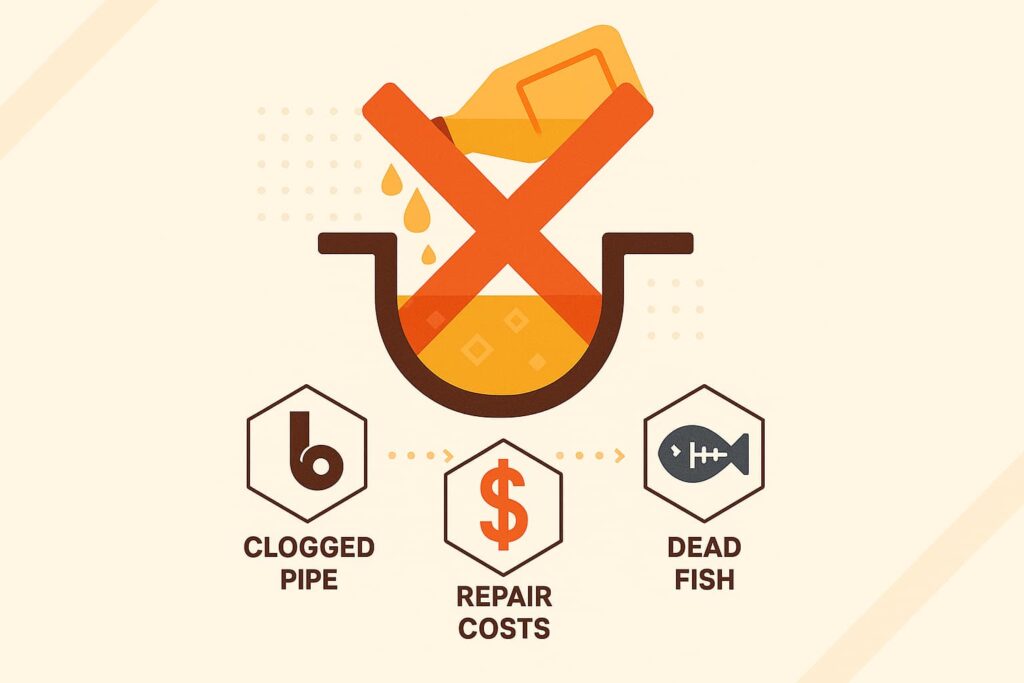
Pouring olive oil down the sink or kitchen sinks can seem harmless at first, but it’s a recipe for disaster. When you pour oil or pour cooking oil down the drain, it cools down, solidifies, and clings to the inner walls of your drain pipes, leading to blockages. Even small amounts can cause significant issues over time, as the oil combines with food particles and other debris to form stubborn clogs.
These blockages don’t just affect your plumbing; they can extend into the municipal sewer system, causing widespread damage. The cooling effect of water accelerates the solidification process of olive oil, making it adhere even more firmly to the pipes. Imagine the accumulation of fats, oils, and grease (FOG) creating a massive fat-berg that can clog your entire drainage system and drains. When the temperature drops, oil solidifies, compounding the issue. Residual oil left in the pipes can accumulate over time, leading to persistent and recurring blockages that are difficult to remove.
The financial implications are just as alarming. Repairing clogged pipes can be costly, often running into hundreds of dollars. Not to mention the inconvenience of a backed-up plumbing system, which can disrupt your daily life significantly. Pouring oil down the toilet is also harmful and should be avoided, as it can cause similar clogs and environmental issues. Avoid these headaches by never pouring oil down the sink to fix the issue.
Consequences of Improper Olive Oil Disposal
The environmental and financial consequences of improper olive oil disposal are severe. Environmental regulations classify oils and fats as waste because they significantly impact water quality when poured down the drain. Cooking oil can harm aquatic ecosystems and is regulated by environmental agencies to prevent such damage. Improper disposal can block sewage systems, leading to expensive municipal repair costs and potential fines if your household is deemed responsible for throwing waste improperly. It is important to avoid putting leftover oil down the drain; instead, put leftover oil in a sealed container and throw it in the trash to prevent plumbing and environmental issues.
The formation of thick, solid residues from poured oil can cause severe plumbing issues, contributing to broader plumbing failures. Leftover oil, when not disposed of properly, can accumulate and cause blockages. Key points include:
- FOG (fats, oils, and grease) blockages are a major cause of sanitary-sewer overflows.
- These overflows result in raw sewage spilling into waterways, posing a significant environmental hazard.
- Fats, oils, and grease account for approximately 47% of sewer line overflows in the United States, often exacerbated by excess oil and grease traps.
Financially, clogged pipes from improper oil disposal are costly to repair and can lead to broader plumbing failures. Some cities even impose fines when household FOG blockages necessitate municipal clean-outs. Proper disposal, including throwing away oil correctly, is not just an environmental responsibility but a financial one as well.
Oil Disposal and Sewer Systems
Pouring cooking oil down the drain might seem like a quick fix, but it can have serious consequences for your home’s plumbing and the entire sewer system. When cooking oil, grease, and food particles go down the drain, they can combine with other substances like wet wipes to form fatbergs—massive, solid clumps that block pipes and cause major backups.
The sewer system is designed to handle wastewater and organic materials, but it’s not built to process large amounts of grease and oil. When these substances enter the system, they can solidify on pipe walls, leading to stubborn clogs that are difficult and costly to remove. Over time, these blockages can cause sewage to back up into homes and streets, creating health hazards and expensive repairs.
Improper oil disposal doesn’t just affect plumbing—it also harms the environment. When oil makes its way through the sewer system and into waterways, it can damage aquatic ecosystems, harming fish, plants, and other wildlife. Even small amounts of oil can have a big impact, especially when combined with other substances in the sewer system.
Home cooks play a vital role in preventing these problems. By pouring used cooking oil into a sealed container or using a grease trap, you can keep oil out of the drains and help protect your plumbing and the environment. Regular maintenance of your plumbing system, including cleaning grease traps and following proper disposal practices, can prevent clogs and reduce the risk of costly backups.
Understanding the impact of cooking oil disposal on the sewer system is essential for every home cook. By making smart choices and avoiding pouring oil down the drain, you can help prevent fatbergs, protect aquatic ecosystems, and keep your plumbing running smoothly.
Safe Ways to Dispose of Olive Oil
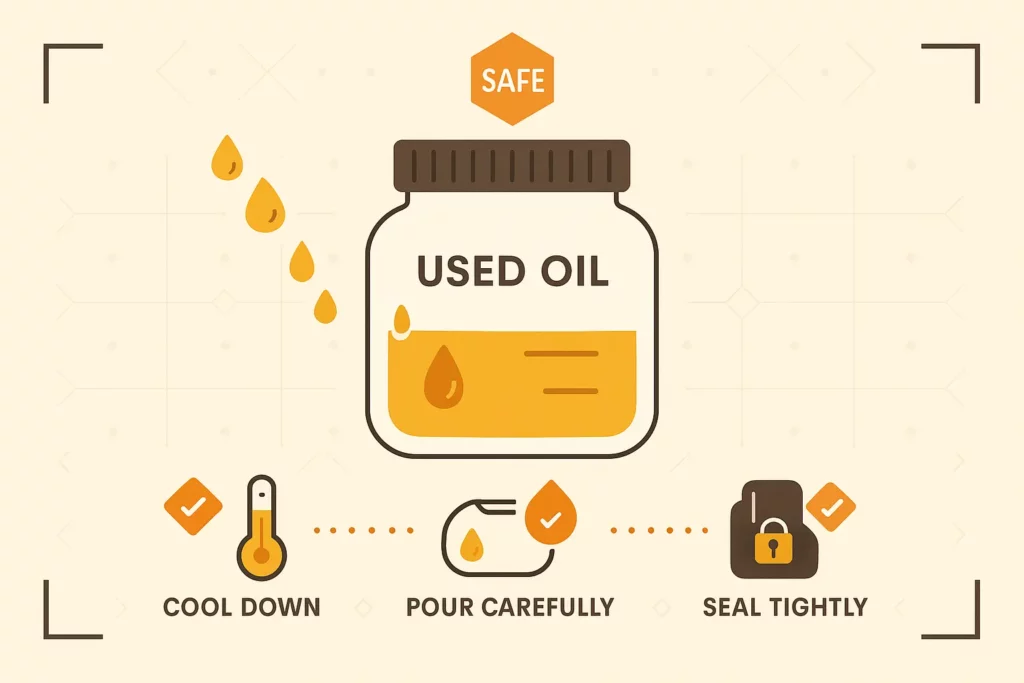
Disposing of olive oil properly is easier than you might think. For small amounts of olive oil (under a tablespoon), a simple and effective method is to wipe it up with a paper towel and toss it in the trash. This prevents even small residues from entering your plumbing system and causing potential blockages.
For larger amounts, follow these steps:
- Let the oil cool down before handling.
- Once cooled, pour it into a sealable, non-breakable container, like an old coffee can or a plastic bottle. Used olive oil should be disposed of in a sealable, non-breakable container and thrown in the trash if no recycling option exists. It’s important to collect used oil in appropriate containers, such as a jar, especially after deep frying, to prevent spills and make disposal or recycling easier.
- Take this container to a local cooking-oil recycling site or place it in the household trash if no recycling option exists.
A funnel can help prevent spills and leaks when transferring used oil into a container. A mix of the oil with absorbent materials like flour or sawdust can convert it into solid waste, making it easier to dispose of. Always check your local solid-waste or water-utility guidelines for specific disposal rules and recycling locations. Liquid disposal methods should also be considered. Coffee grounds, like oil, should not be put down the drain, as they can cause clogs and plumbing issues.
Proper disposal of cooking oil helps protect your plumbing and the environment. These simple steps for cooking oil disposal help you avoid costly repairs and contribute to a healthier ecosystem. Before recycling or disposing of containers, use soap and hot water to wash away any residual oil to ensure safe handling and prevent contamination.
How to Recycle Used Olive Oil
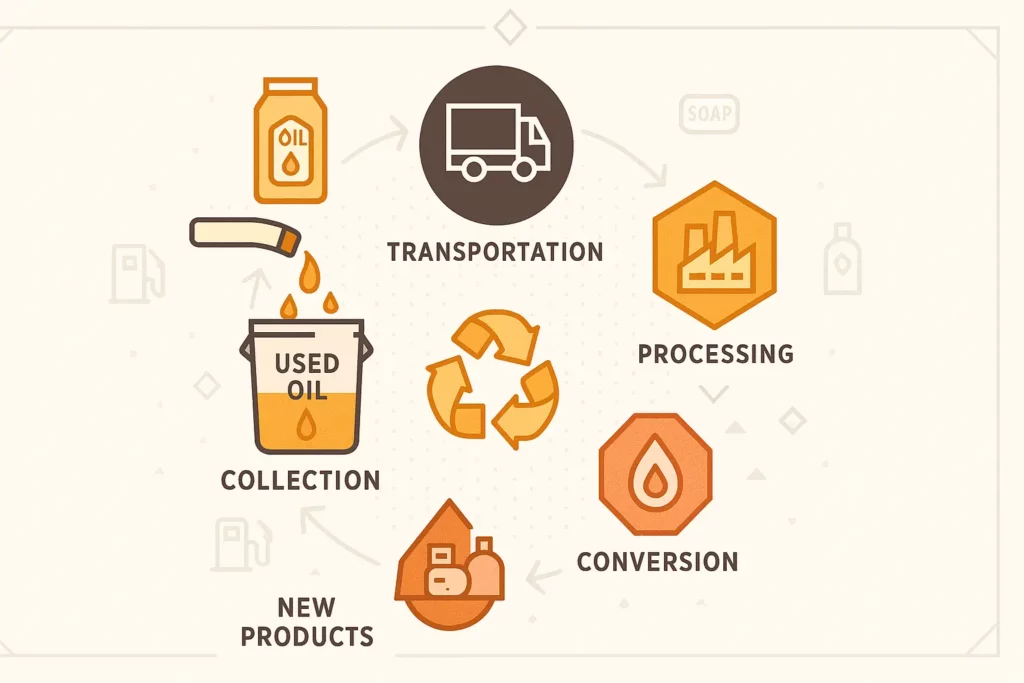
Recycling used olive oils is not only environmentally friendly but also practical. Used cooking oil can be repurposed and recycled, serving as a valuable resource rather than just waste. One of the most significant benefits of recycling is converting used olive oil into biodiesel, which can help decrease reliance on fossil fuels.
Many local recycling centers accept used cooking oil free of charge. You can also contact local restaurants to see if they accept oil for recycling, as they often have systems in place for proper disposal. Restaurants may accept used cooking oil for proper disposal.
Before taking your used olive oil for recycling, consider the following steps:
- Collect the oil in a sealed container to prevent leaks and spills.
- You can store the sealed container in the fridge to prevent odors or spoilage before recycling.
- Filter out food particles to make the oil more suitable for recycling.
- Understand that converting it into biofuel can have various applications.
Recycling your used oil is a simple yet impactful way to contribute to sustainability. When properly collected, used oil can be transformed into valuable resources.
Tips for Reusing Olive Oil
Reusing olive oil can be a great way to minimize waste. Start by straining the cooled olive oil through a cheesecloth or a fine sieve to remove any food particles. If the oil was used to cook foods like vegetables or crêpes, you can often reuse it, but be mindful that the type of food cooked can affect the oil’s flavor and quality. This step ensures that the oil remains clean and free from contaminants, making it safer to reuse.
Once strained, you can pour the cooled olive oil back into its original bottle or another airtight container for storage. Storing the container in the fridge can help preserve the oil’s freshness and extend its usability. Make sure the container is sealed properly to keep the oil fresh. Stored correctly, you can reuse olive oil for up to three cooks, provided it hasn’t turned rancid.
Reusing olive oil not only reduces waste but also saves money. Just ensure the oil is still good to use, and always strain it before storing. With these simple tips, you can make the most out of your cooking oil while being mindful of the environment.
Preventing Olive Oil Spills and Messes
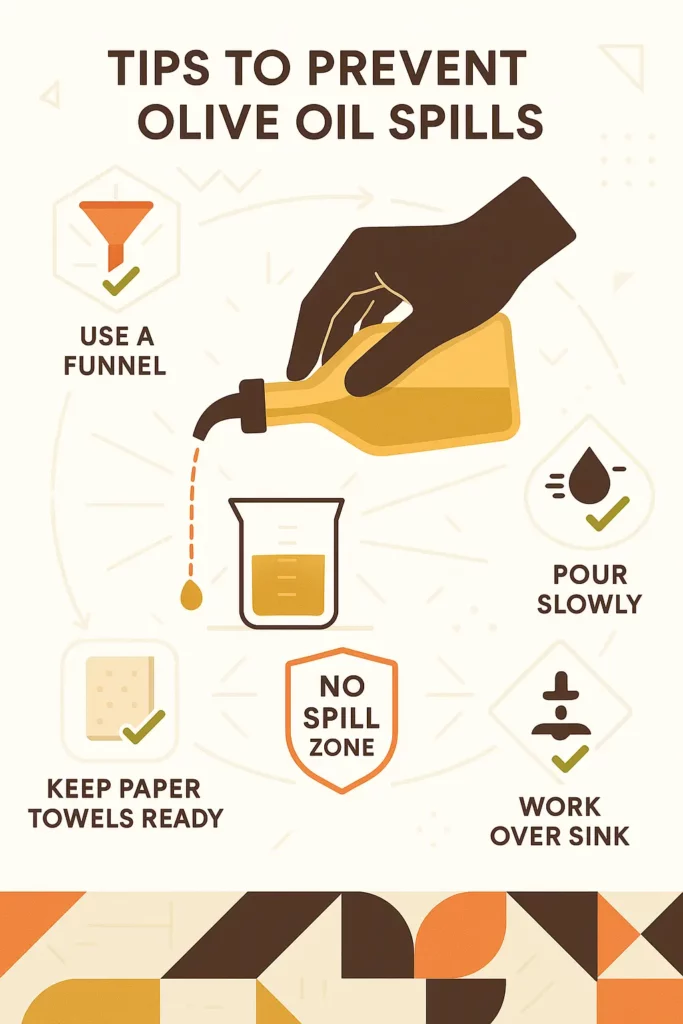
Preventing olive oil spills and messes is crucial for an efficient kitchen. A simple tip is:
- Freeze the oil in a plastic bag or container until solid in the freezer.
- This makes it easier to handle and dispose of without spills.
- This method is especially useful for larger amounts of oil.
Cleaning up oil spill can be made easier with common household items such as:
- Cornstarch
- Flour
- Kosher salt
- Cat litter
These materials can absorb the oil, making it easier to clean up. Additionally, using paper towels to wipe off grease or oil residue before washing dishes can prevent oil from entering your plumbing system.
To absorb oil residue from inside a bottle, use a paper towel and a thin stick to avoid spilling. These preventive measures can save you from dealing with messy and potentially harmful oil spills in your kitchen.
Plus, keeping your kitchen clean means you have more time for the fun stuff, like trying new recipes or just enjoying your meal.
Common Myths About Olive Oil Disposal
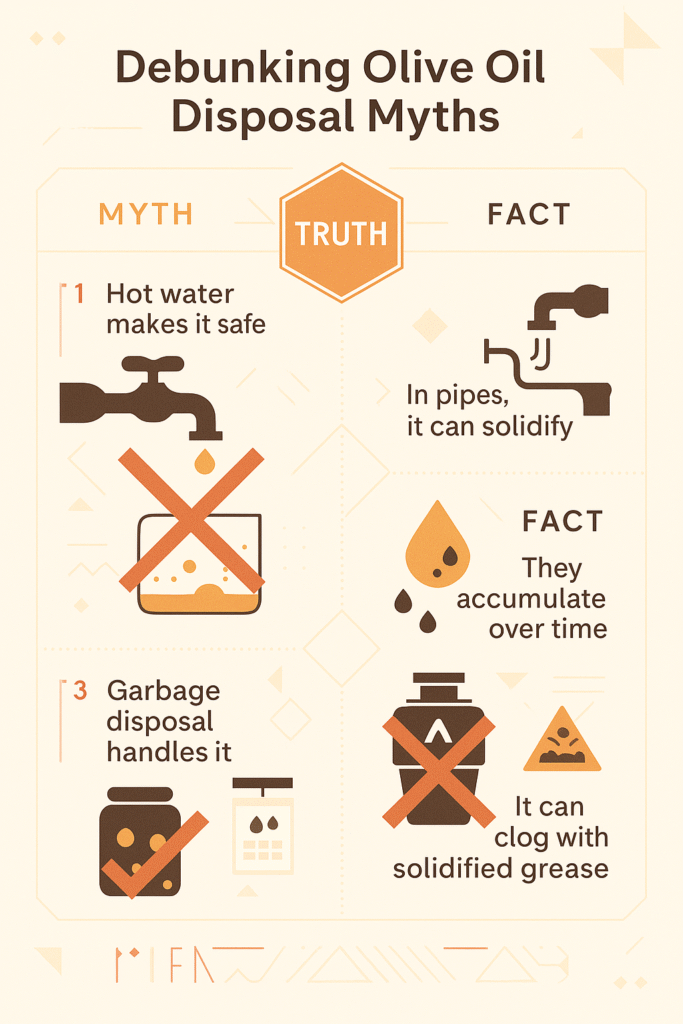
There are several myths about olive oil disposal that need debunking. One common myth is that it’s harmless to pour small amounts of used cooking oil down the drain. However, even small quantities can accumulate over time, leading to significant plumbing issues.
Another misconception is that pouring hot water or detergent or soap down the drain with olive oil will prevent clogs. This method only pushes the problem further down the line and does not solve the problem. Oils do not behave like typical liquids and can solidify in pipes, leading to blockages. While soap and hot water may seem to wash away oil, they do not prevent long-term buildup in pipes.
Understanding these myths is essential for proper disposal. Always remember that even small amounts of oil can cause long-term damage to your plumbing and the environment.
Proper Disposal of Other Cooking Oils
Proper disposal is essential for various cooking oils, as they can impact plumbing and the environment differently. It’s a myth that all cooking oils can be disposed of in the same manner; different oils have varied disposal requirements.
For example, vegetable oil, coconut oil, bacon grease, and butter each have unique characteristics that affect their disposal, unlike other oils and vegetables. Not all oils can be disposed of in the same way. For home cooks, it’s crucial to follow disposal guidelines specific to each type of oil, including bacon fat, to prevent plumbing issues and environmental harm.
By understanding the proper disposal methods for different cooking oils, you can ensure that all the oil used in your kitchen is managed responsibly and know how to dispose of cooking oil. You should not dump used cooking oil outside, as it can harm wildlife and contribute to sewer issues.
Summary
Proper disposal of olive oil is crucial for maintaining a healthy plumbing system and protecting the environment. This blog has covered why you shouldn’t pour olive oil down the sink, the consequences of improper disposal, and the importance of recycling and reusing oil.
By following the safe disposal methods outlined, you can avoid costly plumbing repairs and contribute to a cleaner environment. Recycling and reusing olive oil are simple yet effective ways to minimize waste and promote sustainability.
Remember, every small action counts. Adopt proper disposal habits today, and make a positive impact on your home and the planet.

